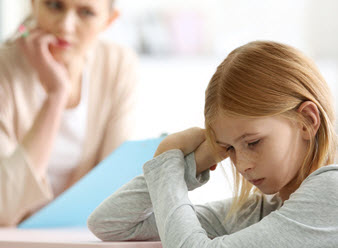Children in therapy might sound absurd to some…
…but it is an area that is less talked about and much needed.
With adults, there are so many ways they can express; they can even pinpoint to what exactly they are feeling. However, with children, they might not even know what they are feeling or experiencing. They don’t have the vocabulary or the tools to deal with the problems they are facing.
And it doesn’t help when adults keep telling children, “You are still so young, you don’t know anything. You will know better when you grow older.” These kinds of expressions often invalidate what the child is feeling.
More than any of this though, a child will never willingly come up to an adult and say ‘Hey, I think I need therapy or help or counseling’. Which is why it is important for the adults in the child’s life to pay attention to them and be on the lookout for any of these warning signs.
1. Suddenly plummeting grades
If your otherwise consistent child’s grades are suddenly dropping it is reason enough to worry about. The problem could be as simple as “I didn’t study at all” to something more complex like the child’s irrational fear of the subject, a teacher’s personal grudge with your child, your child having difficulty understanding or an early sign of an ever grave, deep issue.
2. Loss of interest in school or extra-curricular activities
Did your child, who is usually the first one to sign up on all the extracurricular activities stop attending those clubs? Did your child suddenly stop playing his favorite guitar or stopped painting? Did your child, who always talked about school and loved going, suddenly lose interest in school? Is your child making excuses, trying to avoid going to school? From change in choices, to “children are children”, there are many ways to justify these problems. And yes, there might not be something serious always, but chances are your child is having some trouble with someone at school or has faced something that has made him or her lose faith in himself or herself and the child really needs someone to speak with.
3. Getting in fights
Torn shirt? Ink marks on dresses? Disheveled hair, bruising, broken bag or other damaged school items? These are all more overt signs that your child is facing some trouble at school, either because of someone else or because of something that is troubling internally to the child.
4. Regular nightmares
Is your child waking up screaming or sweating every single night? Do you find your child sleeping in your bed in the middle of the night? Is your child sleep-walking, sleep talking? All these are ways and outlets for the problems the child is facing.
5. Troubling artwork
Art can speak volumes. Either through disturbing poetry, storytelling or paintings, it is possible your child is trying to express what s/he doesn’t feel like sharing directly. Pay attention to this closely.
6. Harming animals
Harming others, especially animals, could be a sign of some deep-seated issue with the child. This should serve as a red flag and parents should immediately take appropriate action. Punishing, grounding a child in such instances is not enough since this doesn’t get you to the core of the problem that the child is facing.
7. Constant worry or anxiety
Is your child constantly stressed out? Let your child know that it is alright to be worried and give him or her the opportunities to unwind. Avoid making comparisons like “In my days I was not only studying but also working at home and working a part time job” or “You get so much and still you complain, look at all those less-privileged kids who get nothing!” Such comparisons don’t help, they invalidate your child’s feelings and could result in sending them in a shell where they no longer share with you their thoughts and feelings.
8. Over-the-top preoccupation with appearances
Is your child suddenly preoccupied with his or her appearances? Is that all s/he can think or worry about? When a parent tells a child not to worry over something as little as how you look, the child feels that the parent can never understand them. For a child, that is not a little issue. Helping your child come to terms with his or her appearances is very important to build their confidence and self-image. And doing this early in life can only be helpful in the long run.
9. Excessive repetition of routines
Is your child constantly washing hands, retracing steps, checking homework a hundred times repeatedly? Such repetition of routines at an early age could trigger deep-seated obsessive-compulsive behaviors.
10. More overt signs
Stealing, complains from other parents and teachers, violence, truancy, are some other more overt signs that your child’s mind is troubled and that s/he needs professional help.
This list contains just some more commonly observed signs among children and might not include the behavior your child is showing. Keeping a watchful eye and observing are the best solutions to this.



